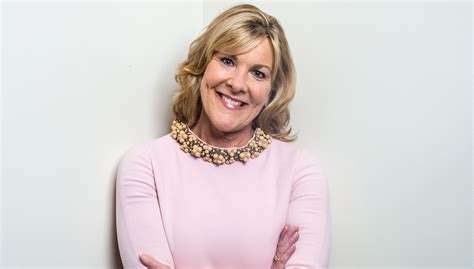A Quote by Tricia Griffith
We've found that the more products our customers have with us, the longer they stay. It's about making sure we listen to our customer needs and get to those pain points.
Related Quotes
We grow by letting the customer tell us. So when the customer tells us that they're frustrated, that they just got their catalogue and we're already out of a product they wanted, then it tells me that we're not making enough. We let the customer tell us instead of creating an artificial demand for our products. Any time you're making products that people don't need, you're at the mercy of the economy, you're at the mercy of whatever is going on. So we tried to avoid that situation.
At the end of the day, customer choice is essential. And we don't make products that compete with Apple, nor make products that compete with Google. Our customers come in both iOS and Android flavors, and I hope our customers can still buy the products they want to purchase wherever they want to purchase them.
People, materials, facilities, money, and time are the resources available to us for conducting our business. By applying our skills, we turn these resources into useful products and services. If we do a good job, customers pay us more for our products than the sum of our costs in producing and distributing them. This difference, our profit, represents the value we add to the resources we utilize.
Pain - physical, emotional and spiritual pain - is more than just a condition that needs to be silenced, numbed or "fixed." Pain in all its forms is also a message, a kind of distress signal to our hearts and minds. There are times when it's really important to tune into that message and just listen to it. When we don't listen, our understanding of the world gets more and more distorted, and we become capable of doing things we very often regret.
Service Over the years, the number one driver of our growth at Zappos has been repeat customers and word of mouth. Our philosophy has been to take most of the money we would have spent on paid advertising and invest it into customer service and the customer experience instead, letting our customers do the marketing for us through word of mouth.
Before making peace, war is necessary, and that war must be made with our self. Our worst enemy is our self: our faults, our weaknesses, our limitations. And our mind is such a traitor! What does it? It covers our faults even from our own eyes, and points out to us the reason for all our difficulties: others! So it constantly deludes us, keeping us unaware of the real enemy, and pushes us towards those others to fight them, showing them to us as our enemies.
Once you know what you want and what is important for you to achieve, also define the values associated with it. What is important? That is something a lot of entrepreneurs pass by too quickly. For us, the things that were important were, No. 1, customer success. Nothing is more important to us than making sure every customer is successful in our service.
We usually do pay attention to our outer appearance, typically noticing whatever part of our bodies we are unhappy about. It behooves us, however, to get on very good terms with more than just the surface of our bodies as we grow older; for if we don't listen to our bodies and pay attention to our physical needs and pleasures, this vehicle that we need to be running well to take us into a long and comfortable life, will limit what we can do and who we become.
Often, very talented technical people find it extraordinarily difficult to take the viewpoint of customers, who are often ignorant about the technology and who may have strong and perhaps incorrect prejudices about it. The technical people may believe, deep down, that they know better what customers "should" need. Customers, of course, have a different perspective. They want products that will solve customer problems and provide other customer benefits, and will do so without undue risk or cost. Not infrequently, customers view advanced technology itself as a risk.
The outside-in discipline requires that you have an explicit customer-based reason for everything you do in the marketplace. Managers need to create what I call "customer pictures," verbal descriptions of customers that highlight the key customer characteristics and make those customers come alive. Although managers never know as much about customers as they want and need to know, the outside-in discipline requires that they construct customer pictures anyway, basing the pictures on whatever hard data they have plus hypotheses and intuition.


































